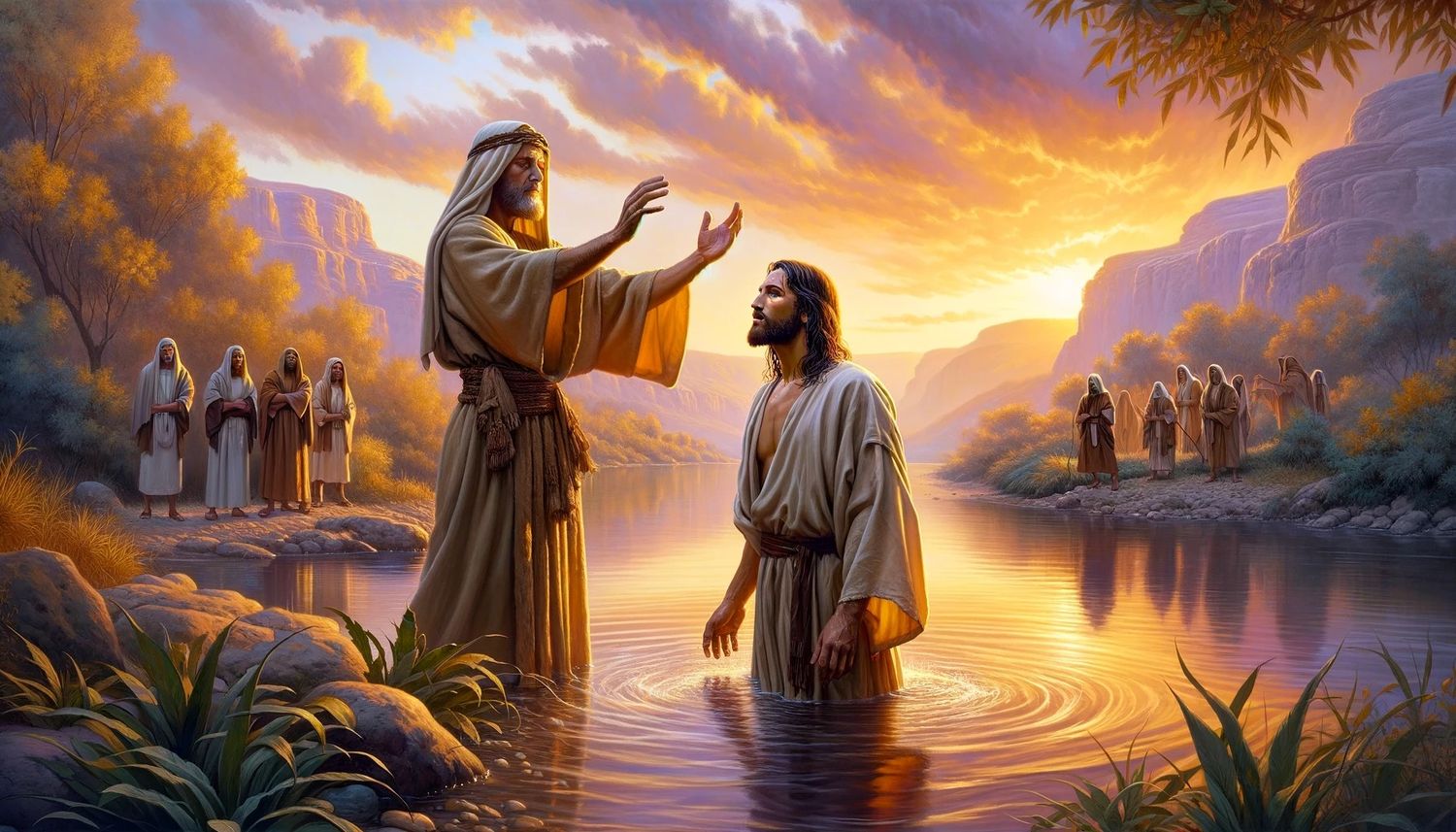Home>Theology and Spirituality>How Old Was Jesus At His Baptism


Theology and Spirituality
How Old Was Jesus At His Baptism
Published: February 29, 2024
Peter Smith, Editorial Director at Christian.net, combines deep insights into faith, politics, and culture to lead content creation that resonates widely. Awarded for his contributions to religious discourse, he previously headed a major organization for religious communicators, enhancing dialogue on faith's societal impacts.
Discover the significance of Jesus' age at his baptism and its theological implications. Explore the intersection of theology and spirituality in this pivotal moment.
(Many of the links in this article redirect to a specific reviewed product. Your purchase of these products through affiliate links helps to generate commission for Christian.net, at no extra cost. Learn more)
Table of Contents
Introduction
How old was Jesus at his baptism? This question has intrigued scholars and believers for centuries. The age at which Jesus was baptized holds significant theological and historical implications. Understanding the age of Jesus at his baptism sheds light on his earthly ministry and the cultural context of the time. In this article, we will explore the importance of Jesus' baptism, delve into the historical context, and examine the age of Jesus at his baptism according to biblical scholars and historical and cultural context. Let's unravel the mystery surrounding the age of Jesus at his baptism and gain a deeper understanding of this pivotal event in Christian history.
The Importance of Jesus' Baptism
-
Initiation of His Ministry: Jesus' baptism marked the initiation of his public ministry. It was a pivotal moment that signified the beginning of his earthly mission to bring salvation to humanity. The act of baptism symbolized his commitment to fulfilling the will of God and serving as the ultimate sacrifice for the redemption of mankind.
-
Identification with Humanity: Through his baptism, Jesus identified with the human experience, demonstrating his solidarity with humanity. By undergoing this ritual, he exemplified humility and obedience, setting an example for his followers to follow. It was a profound demonstration of his willingness to walk alongside humanity in their spiritual journey.
-
Reception of the Holy Spirit: The baptism of Jesus was accompanied by the descent of the Holy Spirit in the form of a dove, affirming his divine anointing and commissioning for his ministry. This divine manifestation validated Jesus' authority and mission, emphasizing the significance of his baptism as a divine endorsement of his role as the Messiah.
-
Foreshadowing His Sacrifice: Jesus' baptism foreshadowed his ultimate sacrifice on the cross. The act of immersion in water symbolized his death and burial, while emerging from the water represented his resurrection. This symbolic representation of death, burial, and resurrection anticipated the redemptive work that Jesus would accomplish through his crucifixion and subsequent triumph over death.
-
Fulfillment of Prophecy: The baptism of Jesus fulfilled the prophecies of the Old Testament, particularly the prophecy in Isaiah 42:1, where the coming Messiah is described as the chosen servant upon whom God's Spirit would rest. This fulfillment underscored the divine orchestration of Jesus' baptism as a significant event in the fulfillment of God's plan for salvation.
-
Establishment of the Trinity: The baptism of Jesus provided a profound revelation of the Trinity, as the Father spoke from heaven, the Son was baptized, and the Holy Spirit descended in the form of a dove. This manifestation of the triune nature of God affirmed the interconnectedness of the Father, Son, and Holy Spirit, laying the foundation for the Christian understanding of the Trinity.
Jesus' baptism holds immense theological significance, serving as a pivotal moment in his earthly ministry and carrying profound implications for Christian doctrine and belief. Understanding the importance of Jesus' baptism provides valuable insights into the foundational aspects of Christian faith and the redemptive work of Christ.
Historical Context of Jesus' Baptism
The historical context of Jesus' baptism provides crucial insights into the cultural and religious backdrop against which this significant event unfolded. During the first century in ancient Judea, the practice of ritual immersion, or baptism, was not uncommon among Jewish communities. It was often associated with purification and repentance, symbolizing the cleansing of impurities and the readiness to lead a renewed life in accordance with God's will. John the Baptist, a prominent figure in the Gospels, emerged as a key proponent of baptism, calling people to repentance and preparing the way for the coming of the Messiah.
The region of the Jordan River, where Jesus was baptized, held profound religious significance in Jewish tradition. It was a place where numerous pivotal events in Israel's history had transpired, including the crossing of the Israelites into the Promised Land under the leadership of Joshua. The act of baptizing in the Jordan River carried symbolic weight, evoking the imagery of spiritual renewal and divine intervention, thereby amplifying the significance of Jesus' baptism in this historically and spiritually rich setting.
Furthermore, the socio-political climate of Judea under Roman rule and the religious landscape dominated by Pharisaic and Sadducean influence set the stage for Jesus' public ministry. Against this backdrop, Jesus' baptism served as a definitive declaration of his identity and mission, setting him apart as the long-awaited Messiah and inaugurating his role as the Savior of humanity. The convergence of historical, religious, and cultural elements during the time of Jesus' baptism underscores the profound significance of this event within its broader context.
Understanding the historical context of Jesus' baptism provides a deeper appreciation of the intricate tapestry of factors that contributed to the unfolding of this pivotal moment in Christian history. It illuminates the interconnectedness of religious, cultural, and political dynamics that shaped the environment in which Jesus embarked on his transformative ministry, ultimately leaving an indelible mark on the course of human history.
The Age of Jesus at His Baptism According to Biblical Scholars
-
No Explicit Mention in the Gospels: The Gospels do not explicitly state the age of Jesus at the time of his baptism. This absence of specific chronological details has led to scholarly debate and speculation regarding the age of Jesus when he underwent baptism by John the Baptist.
-
Inferred Age from Jesus' Ministry: Biblical scholars have attempted to infer the age of Jesus at his baptism based on the timeline of his ministry. The Gospel of Luke provides a chronological marker by mentioning that Jesus began his ministry around the age of thirty. This has led many scholars to propose that Jesus was likely around thirty years old when he was baptized.
-
Cultural Significance of Thirty: In the Jewish tradition, the age of thirty held particular significance as it marked the point at which a person could enter into the priesthood or assume a position of public ministry. This cultural context has further bolstered the argument that Jesus was likely around thirty years old when he received baptism, aligning with the commencement of his public ministry.
-
Symbolism of Age Thirty: Some biblical scholars emphasize the symbolic significance of Jesus being baptized at the age of thirty. They point to the parallel between the age of Jesus at his baptism and the traditional age at which priests began their service in the Old Testament. This alignment underscores the priestly role of Jesus as the ultimate mediator between God and humanity.
-
Harmonization of Gospel Accounts: Scholars also seek to harmonize the Gospel accounts to arrive at a cohesive understanding of Jesus' age at the time of his baptism. While the Gospels of Matthew, Mark, and Luke do not explicitly mention Jesus' age at baptism, the collective narrative of his ministry and the events leading up to his baptism provide a framework for estimating his age within the historical context.
-
Scholarly Consensus: While there may not be unanimous consent among biblical scholars regarding the precise age of Jesus at his baptism, the prevailing view aligns with the inference drawn from the Gospel of Luke, placing Jesus at approximately thirty years old when he underwent baptism by John the Baptist.
The age of Jesus at his baptism remains a subject of scholarly inquiry and interpretation, drawing from the textual and contextual clues present in the Gospels and the broader historical and cultural milieu of the first century. While the exact age may elude definitive confirmation, the consensus among biblical scholars points to the significance of Jesus being around thirty years old when he embarked on his public ministry through the act of baptism.
The Age of Jesus at His Baptism According to Historical and Cultural Context
The historical and cultural context surrounding the age of Jesus at his baptism provides valuable insights into the significance of this pivotal event. In the first-century Jewish society, the age of thirty held particular cultural and religious significance. This age was considered a point of maturity and readiness for assuming positions of leadership, authority, and public ministry. In the Old Testament, the age of thirty marked the commencement of the Levitical priesthood, signifying the assumption of sacred duties and responsibilities. This cultural backdrop underscores the potential significance of Jesus being baptized at the age of thirty, aligning with the traditional age of assuming a role of spiritual leadership and service.
Furthermore, the age of thirty also carried symbolic weight within Jewish tradition. It represented a stage of transition and preparation for embarking on a significant mission or undertaking. In the case of Jesus, being baptized at the age of thirty may have been laden with symbolic meaning, signifying his readiness to embark on his public ministry and fulfill his divine mission as the Savior and Redeemer. The age of thirty, within its historical and cultural context, thus aligns with the notion of Jesus assuming a position of spiritual leadership and embarking on a mission of profound significance for humanity.
Additionally, the age of thirty resonated with the broader socio-religious dynamics of the time. It was an age at which individuals were deemed to have acquired the wisdom, experience, and maturity necessary to assume roles of authority and influence. In the context of Jesus' baptism, the age of thirty may have been perceived as the appropriate juncture for him to publicly declare his mission and commence his ministry, resonating with the cultural expectations and religious symbolism associated with this significant age.
Moreover, the age of thirty also held resonance with the concept of spiritual renewal and transformation. In Jewish thought, the age of thirty was linked to the idea of reaching a stage of spiritual and moral maturity, signifying a readiness to embrace a higher calling and engage in acts of righteousness and service to God and humanity. Jesus' baptism at the age of thirty may thus be viewed within the framework of spiritual renewal and the commencement of a transformative mission that would impact the course of human history.
In light of these historical and cultural considerations, the age of thirty emerges as a compelling and resonant backdrop for Jesus' baptism. It aligns with the cultural and religious symbolism associated with this significant age, underscoring the profound implications of Jesus' initiation of his public ministry through the act of baptism at this particular stage of his life. The historical and cultural context enriches our understanding of the age of Jesus at his baptism, highlighting the depth of meaning and significance embedded within this pivotal event in Christian history.
Read more: Where Did Jesus Go After His Baptism?
Conclusion
The age of Jesus at his baptism has been a subject of profound significance and scholarly inquiry, drawing from biblical, historical, and cultural perspectives. While the Gospels do not explicitly state the age of Jesus at the time of his baptism, the prevailing view among biblical scholars aligns with the inference drawn from the Gospel of Luke, placing Jesus at approximately thirty years old when he underwent baptism by John the Baptist. This age holds particular cultural and religious significance within the first-century Jewish context, resonating with the themes of maturity, readiness for leadership, and the assumption of sacred duties. The historical and cultural backdrop of Jesus' baptism enriches our understanding of this pivotal event, underscoring its profound implications within the broader tapestry of Christian faith and the redemptive work of Christ. Jesus' baptism at the age of thirty serves as a poignant symbol of his readiness to embark on his transformative ministry, marking the initiation of his public mission to bring salvation to humanity. The age of Jesus at his baptism, when viewed through the lens of historical and cultural context, illuminates the depth of meaning and significance inherent in this foundational moment in Christian history.














